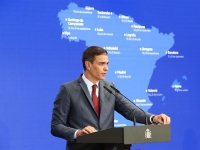Politics
Spain will assume the rotating Presidency of the EU next Saturday
Four areas will focus its presidency
USPA NEWS -
Spain will assume the rotating Presidency of the European Union next Saturday, at a time of political uncertainty due to the call for legislative elections for July 23. If the polls are correct in their predictions, the conservative Popular Party may return to the Spanish Government, which would affect the Presidency of the European Union.
Spain will begin its EU Presidency "with a deep sense of gratitude and responsibility," said Pedro Sánchez in the presentation of the general lines of its action at the head of the European Union. In this context, the President of the Government emphasised the Spanish “pro-European spirit,” recalling that Europe today “is a reality that brings us together as a nation,” he said. "Europe was our gateway to modernity and will be the road that leads us to the best future," Pedro Sánchez explained, pointing out that in times of crisis in recent decades there have been many voices and "many anti-European parties that have gained political weight and even a presence in our institutions." However, "Europe has been stronger than all of them, has overcome the crises and has come out of them stronger," he stated.
President Sánchez has structured the main areas on which Spain will focus its presidency into four main areas. First, the reindustrialization of the EU and ensuring its open strategic autonomy. The President of the Spanish Government recalled the context of international openness which, over the last five decades, has become one of the main drivers of economic and social progress in the EU. In this regard, he reiterated the need to find new ways to move Europe away from excessive dependence on third countries in crucial areas such as energy, health, digital technologies and food. Pedro Sánchez underlined the opportunity that geopolitical, technological and environmental changes offer us to position Europe at the forefront and make the region capable of attracting new companies and jobs, generating wealth and reducing external vulnerabilities in these areas.
In the coming months, the Spanish Presidency will work on two fronts to make progress towards an open strategic autonomy. First, it will promote dossiers that will both encourage the development of strategic industries and technologies in Europe and diversify our trade relations. In this regard, President Sánchez reiterated that Latin America should be a priority, which is why the EU-CELAC Summit will be hugely important. Second, Spain will propose a common strategy with the aim of guaranteeing the EU's economic security and global leadership until 2030. The President of the Government reiterated that Spain is committed to an EU capable of positioning itself as the great architect of the new international order.
As a second priority, Pedro Sánchez highlighted advancement in the ecological transition and environmental adaptation. In this regard, the President of the Government stressed that curbing climate change and environmental degradation will allow us to drastically reduce our dependence on energy and raw materials, thereby lowering our electricity bills and making European companies more competitive. “Moving towards a green transition,” the president said, “will allow us to save up to €133 billion in fossil fuel imports between now and 2030, while making our companies more competitive and creating, along the way, close to a million jobs in this decade alone.”
Strengthening the Social Pillar is at the heart of the presidency's priorities. To this effect, during the next six months, Spain will advocate the establishment of common minimum standards for corporate taxation in all Member States, and will combat tax evasion by large multinationals. "This tax evasion costs Europe 1.5 GDP points every year; the same amount as it invests in building public housing and protecting the environment," stressed President Sánchez.
Furthermore, as the president explained, Spain will prioritize the appropriate revision of the Multi-annual Financial Framework 2021-2027, and will work "to achieve a reform of the fiscal rules that will put an end to the austerity policies that did so much damage during the financial crisis of 2008." It will be a reform that can advance on the path of transparency and combine the sustainability of public finances with the proper financing of the green and digital transitions.
Fourth and last, the Spanish Prime Minister announced that, in a context marked by uncertainty and growing geopolitical tensions, strengthening European unity will be among the priorities of the Spanish Presidency. In this respect, a further deepening of the internal market, the completion of the banking union and the capital markets union will be advocated. Spain will also work to improve and consolidate common instruments such as the Next Generation EU funds, and to move towards a more efficient and coordinated management of migration and asylum processes. "Today I cannot fail to mention yesterday's terrible tragedy in the Ionian Sea, with the shipwreck of a boat full of human beings," the president said. "This dramatic event once again challenges us as democratic societies". This priority, he added, also includes continuing to provide coordinated support to Ukraine and other states.
Liability for this article lies with the author, who also holds the copyright. Editorial content from USPA may be quoted on other websites as long as the quote comprises no more than 5% of the entire text, is marked as such and the source is named (via hyperlink).






